
The golden-fronted woodpecker is a species of bird in subfamily Picinae of the woodpecker family Picidae. It is found in the southern United States, Mexico and parts of Central America.

The red-crowned woodpecker is a species of bird in the subfamily Picinae of the woodpecker family Picidae. It is found in Costa Rica, Panama, Colombia, Venezuela, Guyana, Suriname, and Tobago.

The white woodpecker is a South American species of woodpecker native to the wooded grasslands of Suriname, French Guiana, Brazil, Bolivia, Paraguay, Uruguay and Argentina. It is a bright white bird with black wings and a distinctive small bright yellow eye patch. The IUCN has rated it as a "least-concern species".

The black-cheeked woodpecker is a species of bird in subfamily Picinae of the woodpecker family Picidae. It is found from Mexico south to Ecuador.

The Hispaniolan woodpecker is a medium-sized woodpecker endemic to the Caribbean island of Hispaniola.

The brushland tinamou is a type of tinamou commonly found in high-altitude dry shrubland in subtropical and tropical regions of southern South America.

The stripe-breasted woodpecker is a species of bird in the woodpecker family, Picidae. It is found in Southeast Asia within subtropical or tropical moist lowland forest and subtropical or tropical moist montane forest.

The crimson-naped woodpecker, crimson-breasted woodpecker or scarlet-breasted woodpecker is a species of bird in the family Picidae. It is found in Bhutan, China, India, Myanmar and Nepal. Its natural habitats are subtropical or tropical moist lowland forests and subtropical or tropical moist montane forests. It was previously considered conspecific with necklaced woodpecker.

The Darjeeling woodpecker is a species of bird in the family Picidae. It is found in the northern regions of the Indian subcontinent, primarily in the Himalayas, and in some adjoining areas.

Stierling's woodpecker is a species of bird in the family Picidae. It is native to Malawi, Mozambique, and Tanzania where its natural habitat is tropical dry forests in the Eastern miombo woodlands ecoregion. It is threatened by habitat destruction. The bird is named in honour of the German bird collector N. Stierling.

The golden-naped woodpecker is a species of bird in the woodpecker family Picidae. The species is very closely related to the beautiful woodpecker, which is sometimes treated as the same species. The two species, along with several other species, are sometimes placed in the genus Tripsurus.
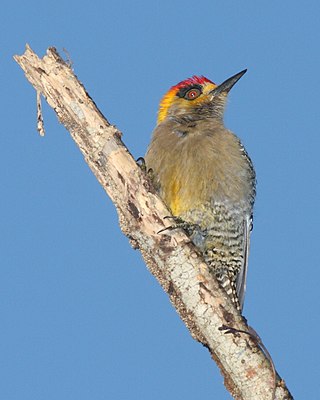
The golden-cheeked woodpecker is a species of bird in subfamily Picinae of the woodpecker family Picidae. It is endemic to Mexico.
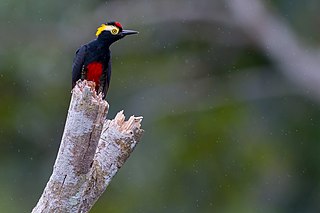
The yellow-tufted woodpecker is a species of woodpecker. It is found in Bolivia, Brazil, Colombia, Ecuador, French Guiana, Guyana, Peru, Suriname, and Venezuela. Its natural habitats are subtropical or tropical moist lowland forests and heavily degraded former forest.
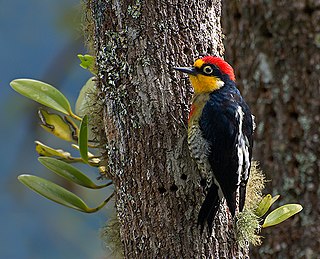
The yellow-fronted woodpecker is a species of bird in the family Picidae. It is found in Brazil, Paraguay and far north-eastern Argentina. Its natural habitats are subtropical or tropical moist lowland forests and heavily degraded former forest. It is a fairly common bird with a wide range and the International Union for Conservation of Nature has classified its conservation status as "least concern".
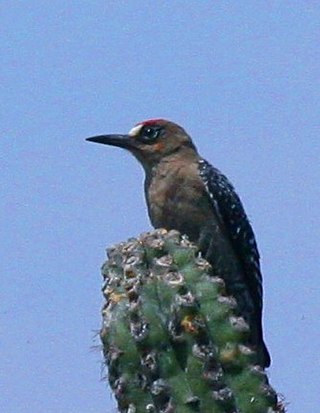
The grey-breasted woodpecker is a species of bird in the family Picidae. It is endemic to the interior of southwestern Mexico.

The beautiful woodpecker is a species of bird in subfamily Picinae of the woodpecker family Picidae. It is endemic to Colombia.

The Yucatan woodpecker is a species of bird in the family Picidae. It is sometimes referred to as the red-vented woodpecker. The Yucatan woodpecker is found in Belize and Mexico, and ranges over the entire Yucatán Peninsula. Its natural habitats are subtropical or tropical dry forests, subtropical or tropical dry shrubland, and heavily degraded former forest.
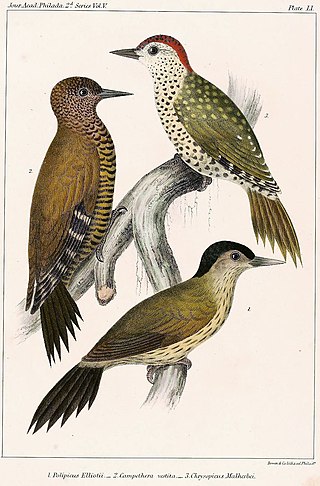
Elliot's woodpecker is a species of bird in the family Picidae. It has an extremely wide range and is described as an uncommon species. However, no particular threats to this species have been established, and the International Union for Conservation of Nature has rated its conservation status as being of "least concern".

The banded woodpecker or the banded red woodpecker is a species of bird in the family Picidae. It is found in Brunei, Indonesia, Malaysia, Myanmar, Singapore, and Thailand. Its natural habitats are subtropical or tropical moist lowland forests and subtropical or tropical mangrove forests.

Velasquez's woodpecker is a species of bird in subfamily Picinae of the woodpecker family Picidae. It is found from Mexico to Nicaragua.






















